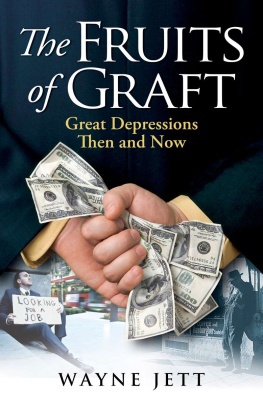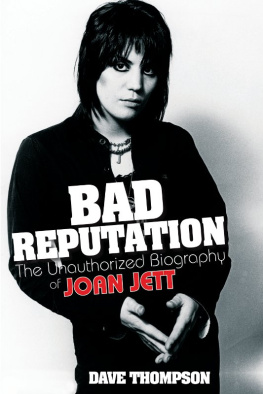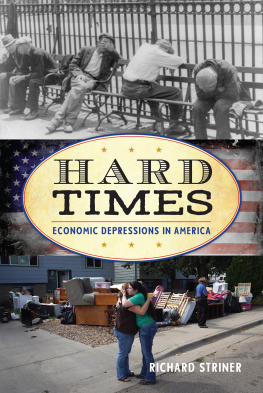Wayne Jett - The Fruits of Graft: Great Depressions Then and Now
Here you can read online Wayne Jett - The Fruits of Graft: Great Depressions Then and Now full text of the book (entire story) in english for free. Download pdf and epub, get meaning, cover and reviews about this ebook. year: 2011, publisher: Launfal Press, Div. of Classical Capital LLC, genre: Science / Business. Description of the work, (preface) as well as reviews are available. Best literature library LitArk.com created for fans of good reading and offers a wide selection of genres:
Romance novel
Science fiction
Adventure
Detective
Science
History
Home and family
Prose
Art
Politics
Computer
Non-fiction
Religion
Business
Children
Humor
Choose a favorite category and find really read worthwhile books. Enjoy immersion in the world of imagination, feel the emotions of the characters or learn something new for yourself, make an fascinating discovery.
- Book:The Fruits of Graft: Great Depressions Then and Now
- Author:
- Publisher:Launfal Press, Div. of Classical Capital LLC
- Genre:
- Year:2011
- Rating:4 / 5
- Favourites:Add to favourites
- Your mark:
- 80
- 1
- 2
- 3
- 4
- 5
The Fruits of Graft: Great Depressions Then and Now: summary, description and annotation
We offer to read an annotation, description, summary or preface (depends on what the author of the book "The Fruits of Graft: Great Depressions Then and Now" wrote himself). If you haven't found the necessary information about the book — write in the comments, we will try to find it.
Wayne Jett: author's other books
Who wrote The Fruits of Graft: Great Depressions Then and Now? Find out the surname, the name of the author of the book and a list of all author's works by series.
The Fruits of Graft: Great Depressions Then and Now — read online for free the complete book (whole text) full work
Below is the text of the book, divided by pages. System saving the place of the last page read, allows you to conveniently read the book "The Fruits of Graft: Great Depressions Then and Now" online for free, without having to search again every time where you left off. Put a bookmark, and you can go to the page where you finished reading at any time.
Font size:
Interval:
Bookmark:

The Fruits of Graft
Great Depressions Then and Now
Copyright 2011 by Wayne Jett
All rights reserved. No part of this publication may be reproduced, stored in a retrieval system, or transmitted, in any form or by any means, electronic, mechanical, photocopying, recording or otherwise without the prior written permission of the copyright owner.
Published in the United States of America by Launfal Press,
Division of Classical Capital LLC, a California limited liability company
The Fruits of Graft is a registered trademark of Classical Capital LLC.
Library of Congress Control Number: 2011903730
ISBN 978-0-9837512-0-5
Printed in the United States of America
Jacket and Interior Design and Layout:
Peri Poloni-Gabriel, Knockout Design, www.knockoutbooks.com
To all who experienced the Great Depression, my father and mother Arba E. and Zettia Davis Jett, their descendants, and those in America and the world who strive for greater liberty, justice and prosperity.


I did not read The Grapes of Wrath until this book was nearly completed. In my youth, fictional accounts of my home state of Oklahoma and experiences of its people with the Great Depression seemed redundant and off-putting. Now I rejoice in having read the great book, as it allows me to know The Fruits of Graft honors those wonderful characters as well as millions of real Americans, who very much deserve honor.
In a genuine sense, I am a legatee of the fictional Joad family, whose trials and tribulations were told by John Steinbeck. When I began law practice in Los Angeles during the early Seventies, the late Joseph H. Seymour was board chairman of several organizations which would become my most significant clients.
Joe Seymour grew up in a small town near Bakersfield before and during the Great Depression. As a young man, he gained respect for work ethics, honesty and character of people he knew to be Okies. After he rose to become business manager of a major labor union in California and Nevada, although I was an employer adviser, Mr. Seymour persuaded boards of trustees he chaired that I was worthy of an opportunity to show similar mettle. Later his successor, also a product of Oklahoma and Californias San Joaquin Valley, and others continued the professional relationship for years.
I am grateful to the man known to me as Robert OBrien, a fictional name adopted out of concern for personal safety due to his important work in detecting, analyzing and exposing fraud and manipulation in U.S. financial markets. Bobo, as I call him, read an early version of my manuscript and made extensive, beneficial comments about writing style, presentation and similar matters. If justice ever comes to the U.S. financial sector, in whole or in part, Bobo and others he recruited deserve to be on an honor roll of those who made it happen.
I wish to acknowledge the contributions of Peri Poloni-Gabriel of Knockout Design for her cover design and interior presentation, and of Melody Englund of Songbird Indexing Services for her expertise, each of whom knows and practices her business exceptionally well.
My sisters Ruth and Joyce provided very helpful copy proofing. Also, about a dozen friends and colleagues in and outside the financial sector read my manuscript for substance and provided helpful input. Sincere thanks to each of them, to other friends who have given insights, and to my family for a lifetime of encouragement and inspiration. ~ WJ
C ountless volumes tell of the Crash of 1929 and the Great Depression. Americans carry scars inflicted during that time of starvation, scarcity, broken families, unfulfilled dreams and thrashed optimism. We look back with more sorrow, and forward with more doubt, than before the travail and regression of 1929-1940.
Soft-coal miners competed for jobs paying 50 cents for 12 hours of labor in a 30-inch-wide mine shaft. Prairie farm families fed bramble weeds to livestock and childrennettles or nettle soupto ease hunger. Southern sharecroppers plowed behind a mule sun-up to sundown for 50 cents. Entire families chopped cotton, using hoes to cut weeds and to thin over-planting, for 50 cents an acre when they could get the work. These stories and worse are told again and again, so they will be remembered.
Living the Great Depression carved indelible questions into American minds: Why? Why is this? What caused this to be, that nobody can have anything? Why have so many lost everything they had? What made it, all of a sudden, so nobody can make a living, let alone get ahead? What is it? Who did it? Why are our lives like this?
Who can we shoot? was the question, as Steinbeck framed it in The Grapes of Wrath, which burned in the minds of Oklahoma farmers pushed off land during ownership consolidation of the Thirties. Whether the question was phrased with threatened violence attached is beside the point. The point is that the questionWho did this?was never answered.
Experts say answering the question is impossible. Prominent economists insist any attempt to explain what caused the Great Depression is a search for the Holy Grail. By this they mean the effort to explain is salutary, but naively motivated and doomed to failure.
They are wrong. This book tells the specific actions taken, and who took them, to cause the Great Depression. Scholars of the period will see facts newly assembled in context and economic principles correctly applied here. Actions and consequences are reported for all to consider.
Culpable parties did not appear suddenly in the American landscape in 1929 and disintegrate in 1940. They infiltrated deeply into American society before the Great Depression and remained fully engaged afterwards. Those who unleashed wrath upon America were not foreign foes. They were a small number of dominant elitists in America and Europeexceptionally powerful ones with vast capital and government influencewho aspired to gain full power and ever greater riches for themselves.
Alliance between elite private interests and government power historically was called mercantilism. This oppressive system reigned in western civilization during the Dark Ages, but it failed to snuff outsome say it made more keennatural aspirations for liberty and opportunity. Hard-won political rights of common people finally vented those aspirations, gave rise to the Enlightenment and allowed markets to develop operating practices called capitalism.
Especially in the United States, republican democracy and capitalism produced a burgeoning middle class capable of rivaling the dominant elite for business and for political influence. In the early 20 th Century, mercantilists acted to turn the tide back in their favor. They brought on the Federal Reserve System, the graduated federal income tax and the Great Depression in aggressive moves to destroy the middle class and to achieve unchecked dominance over all governments and people globally.
We have been misled about these matters and about economics. Keynesian economic theory, which purportedly guides U.S. economic policy today, is not applied to improve conditions or prospects of humanity. Keynesian theory is used to confuse and mislead non-economists, and to disguise motives and actions of mercantilists.
Font size:
Interval:
Bookmark:
Similar books «The Fruits of Graft: Great Depressions Then and Now»
Look at similar books to The Fruits of Graft: Great Depressions Then and Now. We have selected literature similar in name and meaning in the hope of providing readers with more options to find new, interesting, not yet read works.
Discussion, reviews of the book The Fruits of Graft: Great Depressions Then and Now and just readers' own opinions. Leave your comments, write what you think about the work, its meaning or the main characters. Specify what exactly you liked and what you didn't like, and why you think so.











